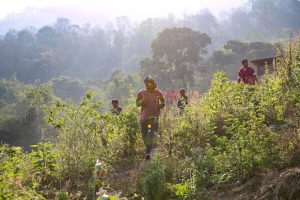On August 7, the Indigenous people of Thailand won a historic legal victory, one that granted us long-overdue justice, dignity and protections for our traditional ways of life.
Some characterized the passage of the Ethnic Groups Protection and Promotion Bill as a “symbolic gift” from the government to mark Thai Indigenous People’s Day on August 9. But for us, it was so much more.
This law, which we helped draft, marks the first time in Thai history that the identity, culture, and rights of ethnic communities have been legally recognized. It is a tool that will help Thailand’s 6 million Indigenous people fight for and protect their rights. And from now on, we have a legal pathway to help resolve conflicts for the thousands of families in forest areas who, until now, have had no way to fight back.
However, even while we celebrate, we must acknowledge that there are still challenges. Some parts of the bill were weakened during the legislative process. For example, the term “Indigenous Peoples” was removed, and there are still restrictions on declaring protected areas for ethnic groups due to existing forest and conservation laws.
To ensure that our cultural rights and way of life are fully protected, we are calling on the government to: Pass sub-laws and regulations to support this bill, doing so with the participation of ethnic communities and the public; eliminate policies and laws that negatively affect ethnic groups related to land, forests, and seas; and work to dispel the negative stereotypes of ethnic groups that can lead to discrimination, contempt, and violations of human dignity, both in public discourse and in future government policies.
For decades, Thailand’s Indigenous communities have faced deep-rooted prejudice. We have been villainized as forest destroyers and accused of encroaching on land we have lived on for generations. We have endured outright discrimination, land seizures, forced displacement, and criminal prosecution. Many of our communities have been forced to abandon where and how we live, how we feed our families, even how we honor our dead.
These negative perceptions have shaped government policy, education in the public schools, and enforcement of the law. They have also eroded our cultural identity and undermined our rights. When we demanded our rights to the land we’ve lived on for ages, we were seen as overstepping and accused of demanding land titles.
Indigenous people however have never been the enemy of the forest; we have been its caretakers. This is why we had to fight for a law to protect our cultural rights and way of life.
In the past, we’ve pushed for legislation, but those bills never passed. In 2010, we finally won a Cabinet resolution acknowledging the livelihoods of Karen and Moken peoples. It created committees, allowed case-by-case negotiations, and gave some hope – but no lasting solutions. The resolution did not grant us legal standing or protect us from land seizures or prosecutions that have left many stateless.
So, we organized. This was a movement started by villagers who had been wronged and whose rights had been violated. From the mountains to the valleys, we worked to gather more than 10,000 signatures to submit to Parliament demanding legal protection. Earlier this month, our voices were finally heard.
This is not the end of the struggle. It is the beginning of a new era – one where we move from resistance to participation, inclusion and, hopefully, mutual understanding.
We must work together to educate villagers about the law and campaign for its concrete and strong implementation at the local level, especially in areas with conflicts and disputes with officials.
And we must work together to address the deeply ingrained prejudices within the education system. Children – both in mainstream schools and ethnic villages – deserve to learn the truth about the diverse cultures of Thailand. Our traditions and way of life should not be excluded from the national narrative but honored as part of our nation’s rich cultural heritage.
Yes, the Ethnic Protection Bill is imperfect. But it does mark a turning point. Indigenous people in Thailand finally have a law that recognizes our identities, protects our rights and affirms our cultural traditions that have allowed us to take care of and conserve the forests. Going forward, there will be a balance between people, the forest, and our culture. For the first time, Thailand is seeing us as equal citizens, with rights, voices – and a future.

































